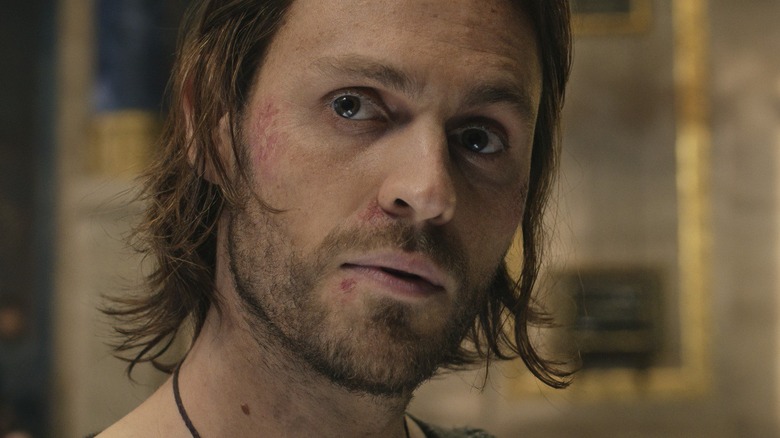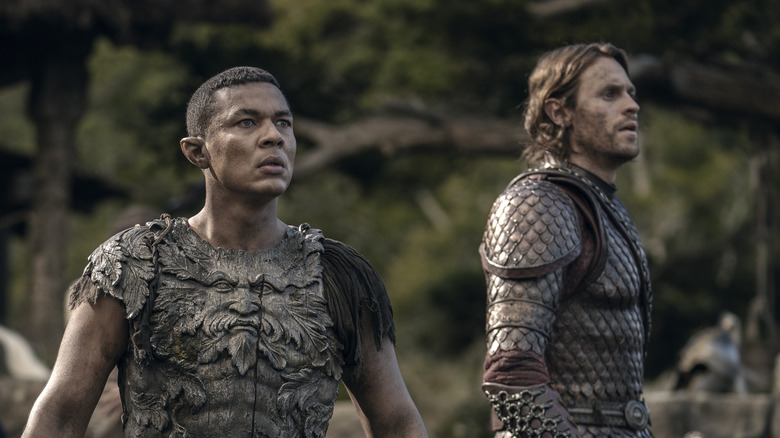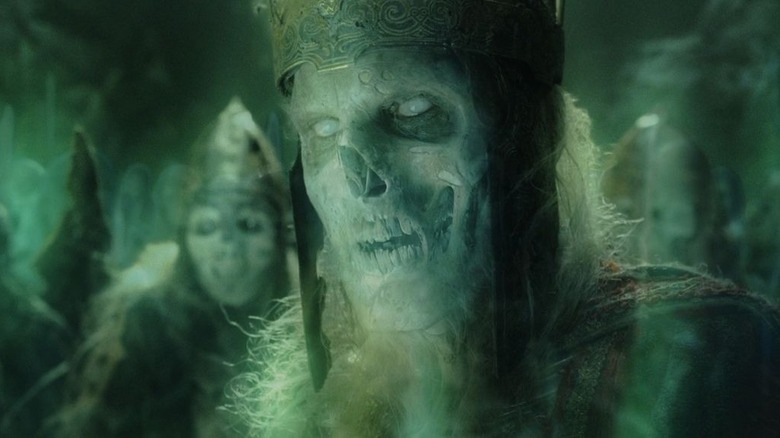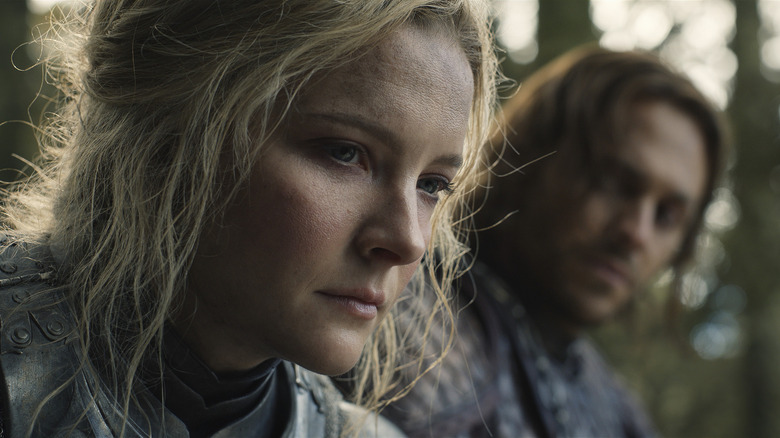The Rings Of Power May Have Already Introduced The Future King Of The Dead
"The Lord of the Rings: The Rings of Power" is juggling a gargantuan number of characters and narratives by practically any storytelling standard. In Episode 6, we saw many of these individuals collide in a running battle in the Southlands. Adar (Joseph Mawle) and his Orcs initially attack the Ostirith watchtower before following up with a multi-pronged assault on the nearby town of Tirharad where Bronwyn (Joseph Mawle), Theo (Tyroe Muhafidin), Arondir (Ismael Cruz Córdova), and the rest of the locals put up an epic resistance. Eventually, Galadriel (Morfydd Clark), Míriel (Cynthia Addai-Robinson), Elendil (Lloyd Owen), Isildur (Maxim Baldry), and an army of Númenóreans arrived in a eucatastropic moment of glory that saves the day — even if the next one is literally filled with fire and brimstone.
While more than half a dozen main characters duked it out in the Southlands throughout the episode, at the end of the day, there was just one protagonist who remained standing. No, literally, like, everyone else was bowing to him. We're talking about Halbrand (Charlie Vickers), of course. "The Rings of Power" may have introduced this southern fella as an outcast on a shipwrecked raft way back in Episode 2, but since then, Halbrand has quickly risen up the Middle-earth org chart. He gained a prestigious spot in a guild on Númenor, was revealed as a self-exiled king, and by the end of Episode 6, he was reinstated by the Queen Regent of Númenor as the long-promised king of the Southlands. Talk about a meteoric rise.
And yet, the rapid-fire reveal of Halbrand's story has played out so quickly that, by this point, it has created more questions than it has answered.
Who on Middle-earth is this guy?
On paper, Halbrand's story is pretty clear-cut. He's the heir to a throne of a kingdom of Men in the southern regions of Middle-earth. He's reluctant to fulfill his destiny, until fate (by the name of a stubborn and persistent Galadriel) swoops in and pushes him to return to the mainland, where he saves his people and, reluctantly, finally steps into his role as their king. There you go. Case closed. Halbrand is basically a proto-Aragorn from the Second Age.
But we all know that's not where this yarn wraps up, right? Come on, now. We're just three-quarters of the way into Season 1. Besides, Halbrand's superficial story has concluded so quickly, it's left much to be desired. Despite his apparent happy ending, the character's perpetual insistence about his irredeemably dark past and his apparent attraction to Galadriel both leave loose threads waiting to be resolved. This begs the question: What is Halbrand's greater role in "The Rings of Power" story? Clearly, there's more to unpack here — and there are several ways that this could go.
One easy answer is that Halbrand is just what he seems, a completely made-up character whose story will continue to play out as the showrunners and writers see fit. Another option is that he's one of J. R. R. Tolkien's original characters waiting to be revealed, and his entire story up to this point has been a red herring. The speculation about Halbrand's potential "true identity" has been ongoing for a while now. He could be a future Nazgûl — maybe even the Witch-king. He could even be Sauron in disguise. For real. The Dark Lord can shapeshift — his Second Age form as Annatar, the Lord of Gifts, is famously attractive, and he has a complicated backstory. But we have another hunch.
A quick primer on the King of the Dead
When Aragorn rides to the aid of a besieged Minas Tirith in "The Return of the King," he unexpectedly takes the Paths of the Dead. There, he summons a ghastly army of undead soldiery to fulfill an ancient and unfulfilled oath made to the Ranger's ancestor to fight against Sauron. These otherwordly reinforcements end up being a game-changer that helps to deliver Gondor from Sauron's first major assault. But where on earth did this random army of ghouls come from? For that answer, one needs to go back to the Second Age (which happens to be when "The Rings of Power" takes place).
In "The Return of the King" Aragorn gives the TL;DR version of the origin of the Army of the Dead by saying, "But the oath that they broke was to fight against Sauron, and they must fight therefore, if they are to fulfil it. For at Erech there stands yet a black stone that was brought, it was said, from Númenor by Isildur; and it was set upon a hill, and upon it the King of the Mountains swore allegiance to him in the beginning of the realm of Gondor. But when Sauron returned and grew in might again, Isildur summoned the Men of the Mountains to fulfil their oath, and they would not: for they had worshipped Sauron in the Dark Years." The text goes on to explain that in response, Isildur curses the king and he and his people continue to haunt the mountains until Aragorn shows up over 3,000 years later.
Could Halbrand be the future King of the Dead?
As with all adaptations, there are a few things that would have to be adjusted to make this story line up with Halbrand. For instance, Erech is far in the southern part of Middle-earth, but it's much further west than Mordor. Also, lining up Halbrand and Isildur's roles in the story could be a bit of a challenge, since the former would have to swear fealty to the latter, even though they're currently a king and stable sweep, respectively. That said, if Halbrand has worshipped Sauron in his past (similar to how Waldreg sacrifices his fellow Southlander to swear fealty to Adar), it could set the stage for a King of the Dead kind of betrayal in the future.
Again, it doesn't line up perfectly, but the truth is, there would have to be a bit of conniving to get any of the current speculation to work with the source material. For instance, if Halbrand is Sauron in disguise, he technically shouldn't be so chummy with Galadriel. In the book "Unfinished Tales," one version of the story explains that Sauron (in disguise at this point) "endeavoured therefore to placate her, bearing her scorn with outward patience and courtesy." While Galadriel has been intense with Halbrand, she's hardly scorned him so far in the show.
Whatever the answer may be, there's no doubt that Halbrand's story, which seems to be going well at the moment, is far from finished, and there are some dark things in his past that still need to be explored. The question is: Will those past indiscretions feed future failure or push him to play a more redemptive and positive role in the larger "Rings of Power" narrative? Only time will tell.



